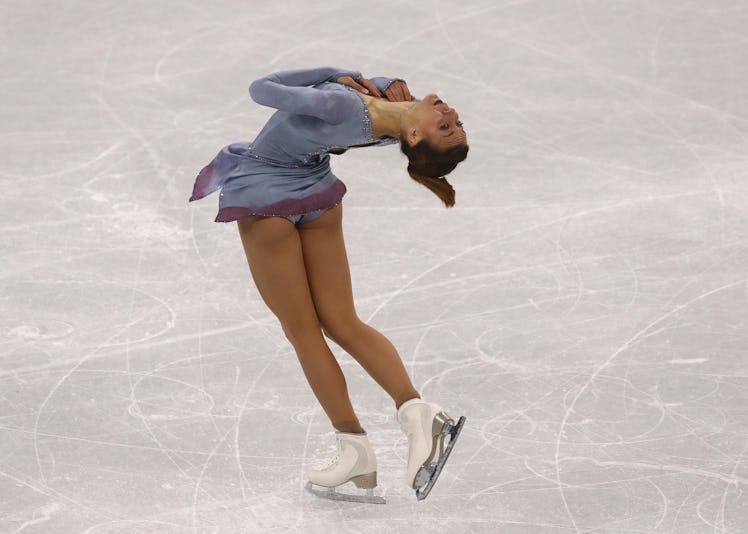
A German Figure Skater Skated To 'Schindler's List' & Twitter Is Cringing
Figure skating is by far one of the Winter Olympics most popular sports, and with good reason. However, song choice can be everything. On Feb. 22 (Feb. 23 South Korean time) German figure skater Nicole Schott maybe didn't choose the best song for her free skate performance, and the tweets about this Schindler's List figure skating routine proves we're all feeling uncomfortable.
Before we all cue a dramatic gasp, music from Steven Spielberg's famous Holocaust film is apparently a common choice for other competitions. Russian figure skater Yulia Lipnitskaya used the song during her skating routine at the 2014 Sochi Winter Olympics, and guess what? She won gold. According to Slate, other figure skaters including Katarina Witt, Irina Slutskaya, and even Johnny Weir have performed their own spin on the Schindler's List score.
Perhaps the popularity to the song stems from the fact that the movie Schindler's List, and original composer John Williams, won an Academy Award and BAFTA for Best Music, Original Score in 1994.
Schott's performance is full of grace and beauty indeed, but the song, particularly combined with the awkward fact that she's a German woman using music from a Holocaust film, truly does distract all of us from her skill. I may have not been able to attend the 2018 PyeongChang Winter Olympics, but I'm cringing from my couch.
Just watch for yourself.
Even though Lipnitskay may have been able to perform her routine without too much backlash, this is 2018.
Twitter isn't having it.
While Twitter was mainly just flabbergasted at the routine, some Twitter users made extremely strong arguments as to why the song was inappropriate. One Twitter user not only discussed Schott's performance, but went on to reference Schindler's List director Steven Spielberg's controversial relationship with the film.
She tweeted,
If you don't understand why this isn't appropriate music: Schindler's List is a movie about Jewish genocide. Steven Spielberg refused a salary for making it, saying it would "blood money". The story, the music, and the meaning belong to us. It's not for performance.
According to a New York Times article from after the movie's 1993 release, director Steven Spielberg gave away his money from the film. "I could not accept any money from Schindler's List — if it even made any money," he said. "It was blood money, and needed to be put back into the Jewish community."
Yashar Ali of New York Magazine also took to Twitter to share his thoughts on Schott's performance.
He tweeted,
The German who skated to Schindler’s List tonight at the Olympics reminds me of a clip I found in Nov 2016. Tatyana Navka, the wife of Putin's powerful spokesman Dmitry Peskov, did a Holocaust themed skating performance during a tv competition in Russia.
Author Courtney Mill shared a Twitter thread of thoughts concerning Scott's performance and the impact of the music.
She tweeted,
Okay, so my take on this is again about emotional resonance. You skate to Schindler’s List, you have to grapple with the fact that people have preexisting emotions. And that’s a very sorrowful piece of music. If you don’t have a plan for how to use those emotions it is maybe a sign that this isn’t a great music choice?
Figure skating music is a key element in order to perform a gold medal worthy routine, and in fact the rules have changed since the 2014 Sochi Winter Games. Originally, the winter sport only allowed non-lyrical, classical music to be played during routines, but in 2014 the International Skating Union (ISU) announced it would allow music with lyrics to play during free skate competitions.
Clearly this rule received a warm welcome, gauging from the three "Despacito" ice dancing routines that went down on Feb. 19 (Feb. 20 South Korean time).
Even though hearing that song three times during one Winter Olympics event was enough to make me want to rip my hair out, I would have preferred it over Schott's song selection.
The decision to incorporate music with lyrics was made with the hopes that the sport would bring in a broader, younger crowd and increase viewership.
So while Schott didn't use music with lyrics, she definitely got the younger generation's attention. Just maybe not in the way the ISU was hoping for.